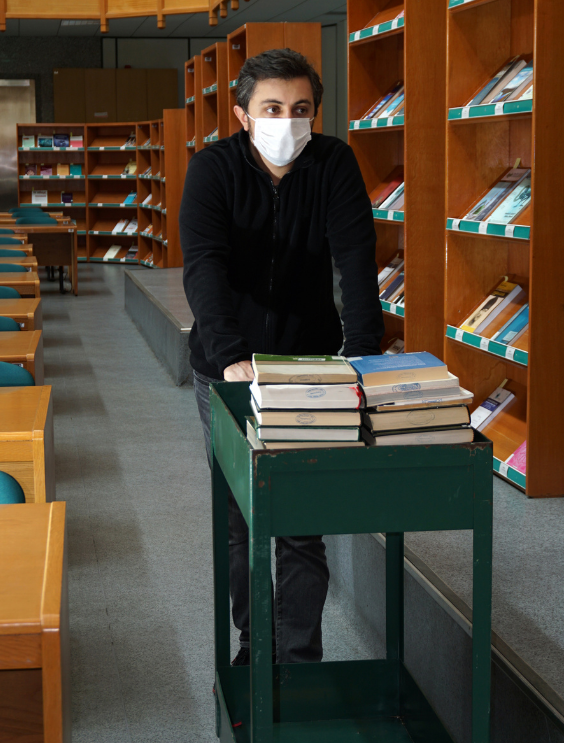Learn About On and Off-Campus Jobs
Off-campus jobs, on-campus jobs, and work-study
Here’s our advice on searching, applying, and interviewing for jobs. If you are planning on working while in college, you have three options.
Off-campus jobs: These jobs are not offered through or associated with the college (e.g. neighborhood daycare, coffee shops, restaurants, etc.).
On-campus jobs: Some of these jobs may be offered through or associated with the college (e.g. cashier at campus bookstore). Other on-campus jobs may not be directly associated with the college (e.g. pharmacy located on campus).
Work-study: Based on your FAFSA, you may be eligible for work-study opportunities. These are jobs that are only available to economically qualified students. These jobs are offered through the college. To find out if you are eligible for work-study jobs, go to the Financial Aid section of your college’s portal website. If you believe you’re eligible for work-study opportunities, but don’t see information in your financial aid award letter, contact your school’s financial aid office to confirm your eligibility.
Tip: Always accept work-study opportunities if possible, but remember that work-study money is earned and not guaranteed income. To learn more, go to our “Things to Know About Work-Study” section below.

Try to work on campus
In general, it is better to work on campus either through work-study or an on-campus job.
The benefits of working on campus are:
- You’ll spend less time and money commuting to your job location
- Managers are generally more understanding of your exam and class schedules and may be more flexible about scheduling
- You’ll get to know staff or faculty who can have your back when you need help
- You’ll have easy access to other on-campus resources like the library, tutoring, and health services

Look early
Jobs can be surprisingly difficult to find. Be proactive and start looking for work several weeks before you get to campus. Work-study positions in particular are not guaranteed or automatically assigned. Keep in mind that you have to find and apply for work-study jobs yourself.
How to find work
Many campuses have an internal job board where students can log on to look for open jobs and work-study positions. Ask your financial aid office if they can provide the link to the work-study or job board website. You can also google your college’s name and “careers” or “career center.”
Here are some other places where you can go to inquire about open work-study positions or other jobs:
- The library
- The tutoring center
- The gym
- The post office
- Campus cafes
- The campus newspaper (some newspapers have paid writing jobs!)
- Student services and resource centers
- Admissions
- College fundraising offices
- The department for your specific major
- The cafeteria
- Ask friends if there are job openings at their workplaces
If possible, try to find a job or work-study position that allows you to explore your career interests.
Applying for positions
Have an up-to-date resume ready to email or hand out. To learn how to create a resume, go to Google Docs’ “Template Gallery” and find a resume template there.
Remember to dress nicely if you visit campus offices to hand out your resume and ask about open positions.
Interviewing for positions
Here are some questions you should be prepared to answer:
- Why do you want this position?
- What relevant experience do you have?
- What are some skills that you possess that would help you in this role?
- How do you cope with stressful tasks?
- What is your schedule and availability?
These are some questions you should ask your interviewer:
- How many hours a week is this position?
- What is the typical schedule?
- Is there flexibility to change the schedule around finals and/or breaks?
- How much does this position pay?
- Are there any other expectations for this job that I should know about?
- Does this position last for the whole year?
Things to know about work-study
- You are not eligible for work-study unless you see this option in the financial aid section of your college’s portal website or award letter.
- Work-study is never guaranteed.
- The college will not assign you a work-study position: you will have to find and apply for these positions.
- Many work-study positions are only available to students who are eligible for work-study; other students can’t apply. However, work-study positions may be limited and therefore fill up quickly. Apply early.
- Some colleges may require you to fill out an additional application and/or information in their financial aid portal to “accept” work-study. Call the financial aid office in advance to ask if you need to fill out anything in order to accept work-study.
- Your college gives you a set amount of money you are eligible to earn from work-study. Once you hit this limit, you can’t continue to earn money through your work-study position (but you could start working at another job). Note this limit may apply for the entire year and/or a single term. Be sure to read the terms of your work-study carefully once awarded and accepted.
- If you get a work-study position, you will be paid directly by the college (probably every two weeks) either through a paper paycheck, debit card, or direct deposit to your bank account.
Tip: If you want to learn more about work-study, check out Nerdwallet’s article, What is Work Study? This piece covers topics like federal work-study FAQs, how work-study affects future financial aid, and more.
How hard is it to find a job or work-study?
Jobs and work-study, though limited, are still available. Your college career center may provide services using an entirely virtual or hybrid format to help you look for work. Your college and local businesses may have also transitioned some jobs from in-person to remote.
Be sure to follow your college career center online and check to see if they have virtual career fairs scheduled. If your college is on Handshake, sign in to see what fairs are scheduled for your campus.
Tip: During your first year in school, be sure to network and find out about opportunities you can take advantage of in the future. You never know what types of opportunities can lead to work that helps you pay your way through college.









